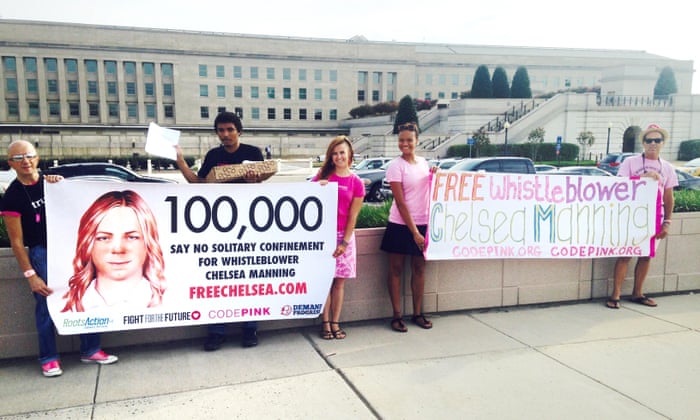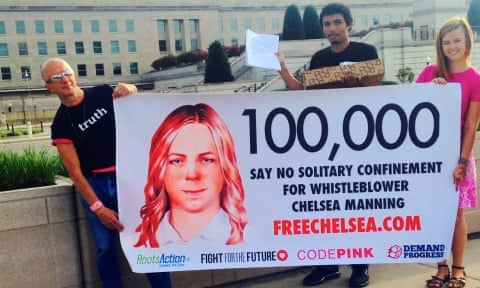Early Recording Found Of King's 'I Have A Dream' Speech
[ This note was placed on the American Left History blog in regard to the passing of Julian Bond but applies to this news item as well. Please-Let's move on here from the "icons" of the civil rights movement 50 plus years ago-has anybody in the media or in politics noticed that in lots of ways the situation for black people here in America is worst than it was then-Enough of nostalgia and that great shining moment of the 1960s]
As The Younger Leaders Of The 1960s Black Civil Rights Movement Pass- Julian Bond At 75
From The Pen Of Frank Jackman
You know today if you know anything about the black liberation struggle here in America (and world-wide but the parameters of the racial issues are slightly different here and better known by me so let’s leave it as here in America) you know that over the past year or so the “torch has been passed” to the younger black militants, their allies, and those around the designation Black Lives Matter trying to organize against the brutal onslaught of deep-seeded racism in “post-racial” America. Organize against the unspoken by obvious oppression that black people face each and every day they wake up in this damn country that does nothing but provide military occupation of the ghettos, allows free-wielding cop harassment and death on the streets, provides no meaningful work, cares nothing of providing serious productive education, grants no hope except dope, authorizes no home except prison and those are just the little talking points. There is plenty more of psychological, sociological and economic devastation that could be gotten into, the beating down of the American fellaheen, the death of dignity.
But later on that. What I want to mention right now after hearing about the death at 75 of Julian Bond an early and prominent leader of the black civil rights movement in the South and of the anti-war movement when that became the issue of the day later in the decade of the 1960s is how irrelevant those “elder statesmen” from that movement which I was intimately involved with in my youth were/are to the struggles today. How the “Uncle Tom” designation that they put on the old time leadership back then came up and bit them as they “shilled” for the government when the do-nothing Democrats were in power and shilled even louder when they were not (do-nothing for the masses for them personally plenty). While everyone has to recognize the personal bravery of these old-timers back in the day when they took on the police state-like conditions of their times they are a deadweight on today’s struggles. It is no accident that guys like Jesse Jackson and Al Sharpton among others are booed by today’s young black and white militants when they dare show their faces because they have abandoned whatever “better angels of their nature” it was that drove them to Doctor King’s door. The time except for a moment’s commemoration of names like King, Jackson, and Bond are over.
The “turn the other cheek,” the expecting of any serious help from the American government, even the notion that we are dealing with a rationale enemy on the question of race is passé. Those ideas died in Memphis in 1968, died in the battlefields of Vietnam too. So while I think back today to the sunnier days when Julian Bond was denied his seat in the Georgia legislature for his righteous opposition to the Vietnam War it is time to discard those old strategies that might have worked when the question was granting simple civil rights were at stake but are worthless when questions of life and death are on the table. RIP Julian Bond RIP.
Listen to the Story
7:14
Renee Montagne talks to Jason Miller, a North Carolina State University professor, who discovered the recording, and Herbert Tillman, who attended that speech as a high school student in 1962.
DAVID GREENE, HOST:
In 1962, the Reverend Martin Luther King, Jr., gave a speech in Rocky Mount, N.C.
(SOUNDBITE OF SPEECH)
MARTIN LUTHER KING JR: I have a dream tonight. It is a dream rooted deeply in the American dream.
GREENE: Of course, that phrase would become far more famous when Dr. King repeated it the following year at the March on Washington. But what you just heard is a recording of the first known version of the "I Have A Dream" speech. The recording was released publically just last week. It was discovered by Jason Miller, a professor at North Carolina State. He was traveling the country researching the origins of the famous speech and ended up finding it just an hour from his office, hidden in a public library in Rocky Mount. Our colleague Renee Montagne spoke to Professor Miller, as well as Herbert Tillman, who saw Dr. King speak in Rocky Mount in 1962.
RENEE MONTAGNE, HOST:
Welcome to both of you.
HERBERT TILLMAN: Thank you.
JASON MILLER: Thank you.
MONTAGNE: I would like, Professor Miller, to start with you. What was the first clue that you found?
MILLER: So the first clue I found was a old typed-out transcript that had all kinds of errors, mistakes in it, question marks because it was incomplete. And the first thing I said to myself, well, if someone was able to make an actual transcript at some point in time, there must be an audio. And so finally I was able to track down, after contacting numerous people, that it had showed up in this public library in Rocky Mount. And this reel-to-reel tape, about seven inches in diameter, was in a box with rust on it. The actual plastic on the reel was cracked, and the end of the tape was frayed. But I was very, very hopeful that it was what I thought it was because inside, in pencil, was written these words - Doctor King's speech November 27, 1962. Please do not erase.
MONTAGNE: Pretty amazing that it was even usable.
MILLER: Yeah, it was my first concern, Renee. But fortunately it hadn't had any water damage or exposure to sunlight and that's what saved it.
MONTAGNE: And, Herbert Tillman, you were a student at Booker T. Washington High School in Rocky Mount where Martin Luther King gave that speech. Take us back to the room. What would you be seeing?
TILLMAN: Basically people were shoulder to shoulder. Our auditorium wasn't large enough so we put it in the gymnasium so they were up on the bleachers and everything all around, and it was just anticipation, waiting for Martin Luther King to actually come on stage. And when he actually walked on stage, everybody just rejoiced with jubilance and excitement.
MONTAGNE: He was indeed by 1962 already a towering figure.
TILLMAN: Exactly. And what he was doing in the deep Southern states were some of the same things that were going on in Rocky Mount, N.C. and by him coming, it was giving us hope also.
MONTAGNE: Why don't we play a little bit of that tape now to take us to that moment that you, Herbert Tillman, actually experienced. And when you say he had a message that he was bringing throughout the South - let's listen now to a bit of the speech, where his message is about voting rights.
(SOUNDBITE OF SPEECH)
KING JR: We're going to break down the barriers of segregation. We must continue to register and vote in large numbers, for I am convinced that one of the most significant steps that the Negro can take at this hour is that short walk to the voting booth.
MONTAGNE: Now, you would've been a very young man - a teenager, a student.
TILLMAN: Right.
MONTAGNE: But at that time, did you think of yourself as having a chance to vote?
TILLMAN: Well, let's put it this way. At that time, even though I was in high school I had a part-time job where I would work after school. And I remember the business that I was working for stopped everything and had a meeting downstairs where they brought all the blacks, and it was getting close to time for voting. And basically what he had called all the blacks down for was to tell us that if he caught any of his black employees and found out that they were at the voting booths trying to vote that their job would be in doubt.
MONTAGNE: Let me turn you, Professor Miller, is there anything else in this Rocky Mount speech that anticipates Dr. King's famous, legendary speech in Washington, D.C.?
MILLER: There is. And during my research for my book "Origins Of The Dream," I listened to about 120 different sermons and speeches by Dr. King and I've never heard one quite like this. It has part the feel of a mass meeting, it has the formality of the civil rights speech and it has the spirit of a sermon. And Dr. King ended this speech with his three most famous endings. And he starts in what he called his "How long? Not long," set piece. Then he goes into eight lines of "I Have A Dream." That's actually two longer than the famous one in Washington.
(SOUNDBITE OF SPEECH)
JR: I have a dream tonight. (Inaudible) to do unto them. I have a dream tonight. (Inaudible) not just because of the color of their skin, but on the (inaudible) fact that they are members of the human race. I have a dream tonight.
MILLER: So this actually has more of "I Have A Dream" than the speech we all know. Third and finally, he goes into his "Let Freedom Ring" set piece which he had been using in different speeches way back to 1956.
(SOUNDBITE OF SPEECH)
JR: From every mountainside, let freedom ring. So let it ring from Stone Mountain in Georgia. Let it ring from Lookout Mountain in Tennessee.
MONTAGNE: Mr. Tillman, hearing this speech again, how did it strike you? I mean, what was the feeling like? Because you wouldn't have probably ever expected to hear it again.
TILLMAN: No I didn't expect to hear it again. And even after all this time, it kind of kicks in some of the memory recall and the emotions, you know, were very, very high. I remember how excited and how everybody applaud and clapped and was joyous. Just listening to it again made me feel the same things - I really felt all of those emotions in my heart.
MONTAGNE: I just had the impression you might have sort of a feeling of joy and also a tear in your eye.
TILLMAN: You're right. You're correct.
MONTAGNE: Well, thank you both very much for joining us.
TILLMAN: Thank you very much.
MILLER: It's been our pleasure.
GREENE: Herbert Tillman and Professor Jason Miller speaking to our colleague Renee Montagne.
In 1962, the Reverend Martin Luther King, Jr., gave a speech in Rocky Mount, N.C.
(SOUNDBITE OF SPEECH)
MARTIN LUTHER KING JR: I have a dream tonight. It is a dream rooted deeply in the American dream.
GREENE: Of course, that phrase would become far more famous when Dr. King repeated it the following year at the March on Washington. But what you just heard is a recording of the first known version of the "I Have A Dream" speech. The recording was released publically just last week. It was discovered by Jason Miller, a professor at North Carolina State. He was traveling the country researching the origins of the famous speech and ended up finding it just an hour from his office, hidden in a public library in Rocky Mount. Our colleague Renee Montagne spoke to Professor Miller, as well as Herbert Tillman, who saw Dr. King speak in Rocky Mount in 1962.
RENEE MONTAGNE, HOST:
Welcome to both of you.
HERBERT TILLMAN: Thank you.
JASON MILLER: Thank you.
MONTAGNE: I would like, Professor Miller, to start with you. What was the first clue that you found?
MILLER: So the first clue I found was a old typed-out transcript that had all kinds of errors, mistakes in it, question marks because it was incomplete. And the first thing I said to myself, well, if someone was able to make an actual transcript at some point in time, there must be an audio. And so finally I was able to track down, after contacting numerous people, that it had showed up in this public library in Rocky Mount. And this reel-to-reel tape, about seven inches in diameter, was in a box with rust on it. The actual plastic on the reel was cracked, and the end of the tape was frayed. But I was very, very hopeful that it was what I thought it was because inside, in pencil, was written these words - Doctor King's speech November 27, 1962. Please do not erase.
MONTAGNE: Pretty amazing that it was even usable.
MILLER: Yeah, it was my first concern, Renee. But fortunately it hadn't had any water damage or exposure to sunlight and that's what saved it.
MONTAGNE: And, Herbert Tillman, you were a student at Booker T. Washington High School in Rocky Mount where Martin Luther King gave that speech. Take us back to the room. What would you be seeing?
TILLMAN: Basically people were shoulder to shoulder. Our auditorium wasn't large enough so we put it in the gymnasium so they were up on the bleachers and everything all around, and it was just anticipation, waiting for Martin Luther King to actually come on stage. And when he actually walked on stage, everybody just rejoiced with jubilance and excitement.
MONTAGNE: He was indeed by 1962 already a towering figure.
TILLMAN: Exactly. And what he was doing in the deep Southern states were some of the same things that were going on in Rocky Mount, N.C. and by him coming, it was giving us hope also.
MONTAGNE: Why don't we play a little bit of that tape now to take us to that moment that you, Herbert Tillman, actually experienced. And when you say he had a message that he was bringing throughout the South - let's listen now to a bit of the speech, where his message is about voting rights.
(SOUNDBITE OF SPEECH)
KING JR: We're going to break down the barriers of segregation. We must continue to register and vote in large numbers, for I am convinced that one of the most significant steps that the Negro can take at this hour is that short walk to the voting booth.
MONTAGNE: Now, you would've been a very young man - a teenager, a student.
TILLMAN: Right.
MONTAGNE: But at that time, did you think of yourself as having a chance to vote?
TILLMAN: Well, let's put it this way. At that time, even though I was in high school I had a part-time job where I would work after school. And I remember the business that I was working for stopped everything and had a meeting downstairs where they brought all the blacks, and it was getting close to time for voting. And basically what he had called all the blacks down for was to tell us that if he caught any of his black employees and found out that they were at the voting booths trying to vote that their job would be in doubt.
MONTAGNE: Let me turn you, Professor Miller, is there anything else in this Rocky Mount speech that anticipates Dr. King's famous, legendary speech in Washington, D.C.?
MILLER: There is. And during my research for my book "Origins Of The Dream," I listened to about 120 different sermons and speeches by Dr. King and I've never heard one quite like this. It has part the feel of a mass meeting, it has the formality of the civil rights speech and it has the spirit of a sermon. And Dr. King ended this speech with his three most famous endings. And he starts in what he called his "How long? Not long," set piece. Then he goes into eight lines of "I Have A Dream." That's actually two longer than the famous one in Washington.
(SOUNDBITE OF SPEECH)
JR: I have a dream tonight. (Inaudible) to do unto them. I have a dream tonight. (Inaudible) not just because of the color of their skin, but on the (inaudible) fact that they are members of the human race. I have a dream tonight.
MILLER: So this actually has more of "I Have A Dream" than the speech we all know. Third and finally, he goes into his "Let Freedom Ring" set piece which he had been using in different speeches way back to 1956.
(SOUNDBITE OF SPEECH)
JR: From every mountainside, let freedom ring. So let it ring from Stone Mountain in Georgia. Let it ring from Lookout Mountain in Tennessee.
MONTAGNE: Mr. Tillman, hearing this speech again, how did it strike you? I mean, what was the feeling like? Because you wouldn't have probably ever expected to hear it again.
TILLMAN: No I didn't expect to hear it again. And even after all this time, it kind of kicks in some of the memory recall and the emotions, you know, were very, very high. I remember how excited and how everybody applaud and clapped and was joyous. Just listening to it again made me feel the same things - I really felt all of those emotions in my heart.
MONTAGNE: I just had the impression you might have sort of a feeling of joy and also a tear in your eye.
TILLMAN: You're right. You're correct.
MONTAGNE: Well, thank you both very much for joining us.
TILLMAN: Thank you very much.
MILLER: It's been our pleasure.
GREENE: Herbert Tillman and Professor Jason Miller speaking to our colleague Renee Montagne.


 Worse yet, Chelsea faces this incomprehensibly severe punishment as a result of ridiculously innocuous institutional offenses, including the possession of books and magazines related to politics and LBGTQ issues (which she received openly via the prison mail system), and having a tube of toothpaste that was past its expiration date (apparently deemed “medical mis-use”). The catalyst for this attack on Chelsea seems to have been an incident in the mess hall where she may have pushed, brushed, or accidentally knocked, a small amount of food off of her table. She then asked to speak to her lawyer when confronted by a guard. The absurd charges were tacked on later.
Worse yet, Chelsea faces this incomprehensibly severe punishment as a result of ridiculously innocuous institutional offenses, including the possession of books and magazines related to politics and LBGTQ issues (which she received openly via the prison mail system), and having a tube of toothpaste that was past its expiration date (apparently deemed “medical mis-use”). The catalyst for this attack on Chelsea seems to have been an incident in the mess hall where she may have pushed, brushed, or accidentally knocked, a small amount of food off of her table. She then asked to speak to her lawyer when confronted by a guard. The absurd charges were tacked on later.

 Chelsea Manning is depicted on the cover of the July 2015 Counter Punch magazine, along with Edward Snowden and Cornell West.
Chelsea Manning is depicted on the cover of the July 2015 Counter Punch magazine, along with Edward Snowden and Cornell West.






